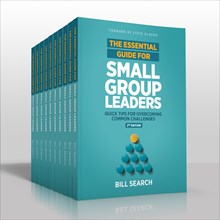This Week

What You Should Not Share with Your Small Group
Three things you should keep to yourself

How to Pray for Your Small-Group Ministry
Head to battle with the appropriate spiritual weapons.

Leading Small Groups into Emotional Vulnerability
Tips for creating a warm and open group environment

Engaging in Tough Conversations
Interpersonal communications expert Mike Bechtle shares his insights on conflict resolution.
Training Tools

Healthy Boundaries for Small Groups
How to set healthy boundaries with group members

Effectively Confront Leaders
Learn how to address issues in a healthy, biblical way.
Bible Studies

Psalms: Managing Our Emotions
In this 12-session study, learn how God's word in the psalms deeply affects our emotions.

1 Peter: Walk the Talk
Transformation—the process of becoming holy—begins in your mind.
Books & Courses
Quick Links
Healthy Leaders
Keep a close relationship with Christ, avoid burnout, and even rest from ministry.
Learn MorePricing
Multi-User Plan
Get full access to Bible studies, Training Tools, and articles for a group of people.

















